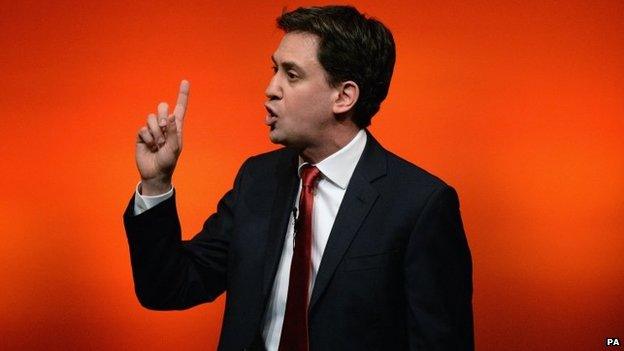Scottish independence: Ed Miliband makes case for Union
- Published

Mr Miliband said he cares deeply about how Scottish voters choose on independence
Scottish independence would leave working people north and south of the border worse off, Ed Miliband has claimed.
The Labour leader made his comments as the shadow cabinet met in Scotland.
He also outlined plans to tackle the "misery" of zero hours contracts.
First Minister Alex Salmond said only a "Yes" vote in the referendum would give Scottish voters the power to tackle social justice issues.
Labour's front bench team met in Glasgow's Emirates Arena as part of a two-day campaign trip to Scotland to urge people to vote "No" to independence.
The Labour leader said he would be "campaigning with my shadow cabinet to keep Scotland in the United Kingdom".
He added: "I don't have a vote in September, but I care deeply about the decision people across Scotland will make, and that's why I wanted to bring my team to Scotland today.
"I want to rebuild our country in the cause of social justice, make the changes needed to tackle the cost-of-living crisis, and create a more successful economy that works for hardworking people here in Scotland and across the UK.
"But I don't believe you can serve the cause of social justice and that of narrow nationalism. There are people in every part of the UK who need decent jobs, a government that will stand up for them against powerful interests like the energy companies and an NHS that is there when we need it most."
Social justice
Speaking on BBC Radio Scotland's Good Morning Scotland programme, Mr Miliband said he had "real confidence" that Labour would succeed in the general election next year, and accused the SNP of trying to "pump up the idea of (another) Tory government in order to make their case".
He said: "My message to the people of Scotland is I have real confidence about the prospect of a Labour government arriving in the a year's time across the United Kingdom.
"We are just one Christmas away from a having a Labour government which will take up the cudgel of social justice on behalf of the people of Scotland and the whole of the United Kingdom."
The Labour leader also restated his party's position on the prospect of a shared formal currency union in the event of independence.
Asked if such a deal - favoured by the SNP - was ruled out under any circumstances, he replied: "Correct."
He added: "All of the lessons from the eurozone are that, if we are going to have a currency union, we also need the kind of fiscal union that we have across the UK.
"That is a sensible economic choice - it is not about the politics."
The Scottish National Party challenged Mr Miliband to use his visit to Scotland to say what would happen to public spending if Scotland remains part of the UK.
It has claimed changes to the Barnett formula - the method by which the Treasury's sets funding the devolved nations - could cost Scotland £4bn.
Mr Miliband said his party had no plans to scrap the formula, telling BBC Scotland: "We're not going to change it."
The first minister said the Labour leader had "zero credibility" on issues of social justice in Scotland.
Mr Salmond said: "When we take the future of our country into our own hands, that's when the Scottish ideas and the Scottish consensus on issues like the living wage and zero hours contracts can be brought forward."
He added: "Labour has abandoned its principles and its leadership by working hand in glove with the Tories and the Westminster establishment against Scotland taking its future into its own hands.
"A "Yes" vote will mean that we never again have to endure unpopular Westminster Tory governments that we didn't elect - and independence will mean Scotland always gets the governments we vote for, allowing us to take the action we want on issues like the bedroom tax, the living wage and zero hours contracts."